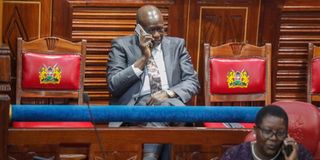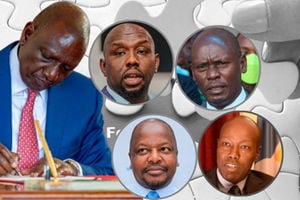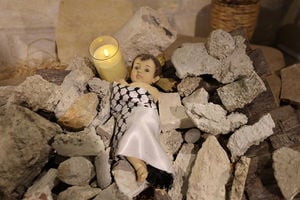
Deputy President Rigathi Gachagua at the Senate for the second day of his impeachment trial.
The impeachment hearings against embattled Deputy President Rigathi Gachagua portrayed him as being irredeemably tribal. But to be fair to the man from Mathira in Nyeri, Mr Gachagua isn’t alone. The difference between him and others considered to be ethnic bigots is that he – unlike them – is the Deputy President. In that office he must by dint of constitutional compulsion be a symbol of national unity.
Kenya is a fractious and fledgling republic which has chosen to try the democratic experiment. That’s why its top national leaders, no matter the nativist and chauvinist fires burning in the bosoms, must never practice naked tribalism. Mr Gachagua has failed this simple test with flying colours. What is more, Mr Gachagua is completely unapologetic about this.
I agree Kenya isn’t a nation yet, but a nation in embryo. For this reason, I expect many in public office and the common hoi polloi to be moored in their pre-colonial sub-national identities. I acknowledge that the inhabitants of the country we call Kenya today didn’t of their own volition create the state we call Kenya. Kenya is the handiwork of colonial cartographers. The people who on paper call themselves Kenyans today were minted by the British Empire. That’s a sad reality that I’ve often struggled to reconcile in my scholarly mind. But it’s a fact that not many people can tell you who a Kenyan is. At most, they can point out Kenya as a geographic location.
Imperial servitude
Most Kenyans reside under the skirt of the tribe. What they don’t appreciate is that the tribe’s skirt is a fake camouflage of identity. Ever since the colonialists collapsed the tribes under imperial servitude, the suzerainty of the tribe became a fantom of nostalgic imagination. In modernity, only the elites benefit by manipulating their “tribes” for their own selfish benefit. Let me tell you something. Kenya’s ethnic elites only discover their ethnic communities in times of personal crisis, or when they want to be elected into office. Otherwise, fellow ethnic kinsfolk be damned. It’s by accident or cynicism that the elites do anything useful for constituents. The ethnic kinsfolk are usually doormats for elites to grab power and riches.
I will give a recent example. I saw video footage this week of an MP from Meru lamenting why he voted to impeach Mr Gachagua, and why he now rues his vote. Without irony, the MP bitterly denounced the impeachment and said with righteous anger that he only voted to impeach because he believed Interior Cabinet Secretary Prof Kithure Kindiki – a fellow tribesman – would be named Deputy President to replace Mr Gachagua. My jaw dropped to the ground. Really? What a disaster of an MP. If these are the folks we rely on to build a democracy and nation, we can as well forget it. We will have no country – let alone build a nation – if leaders think this way.
What’s in a Deputy President’s office for an ethnic group? How did Daniel arap Moi or Kalonzo Musyoka benefit their tribes when they served in the number two slot? I’ve been to Baringo Central, which President Moi represented for an eternity, and it’s a part of Kenya trapped in pre-history. I’ve been to Mwingi from whence Mr Musyoka hails, and we all know the penurious state of the area. There’s even Gatundu, which has produced two presidents, but where some folks survive on food aid. And yet when politicians from these and other areas fall out of favour with the ruling elites, they invariably try to ignite tribal embers against their competitors from other ethnic elites. This is what Mr Gachagua is being accused of doing.
Mt Kenya kingpin
No sooner had Mr Gachagua been appointed as William Ruto’s running mate in 2022 and sworn in as Deputy President than he decided to futilely assert himself the Mt Kenya kingpin. In this quest, he rubbished every other ethnic group in Kenya. He has used the Gikuyu Embu and Meru (GEMA) grouping as his doormat to bargain for personal power. In so doing, he directly took on his boss and other elites from the region. But they counsel you not to throw stones if you live in a glass house. For if your opponents return fire, you may find yourself homeless. This is the fate that has befallen Mr Gachagua. It’s over.
Mr Gachagua’s political waterloo in Kenya Kwanza is imminent. The man has crossed the Rubicon. There is a lesson in Mr Gachagua’s political problems. First, leaders at the apex of the food chain must help Kenya become a nation, not a tribal feeding trough.
Two, the state can eat its own when and if they get out of line. Three, don’t try to destroy your boss and please make sure you succeed, if you do.
Four, learn that not any one of Kenya’s ethnic groups is the child of a lesser god. Five, you can only escape the curse of ethnicity by becoming a true Kenyan, not a tribal bigot.
Makau Mutua is SUNY Distinguished Professor and Margaret W. Wong Professor at Buffalo Law School, The State University of New York. On X: @makaumutua.










